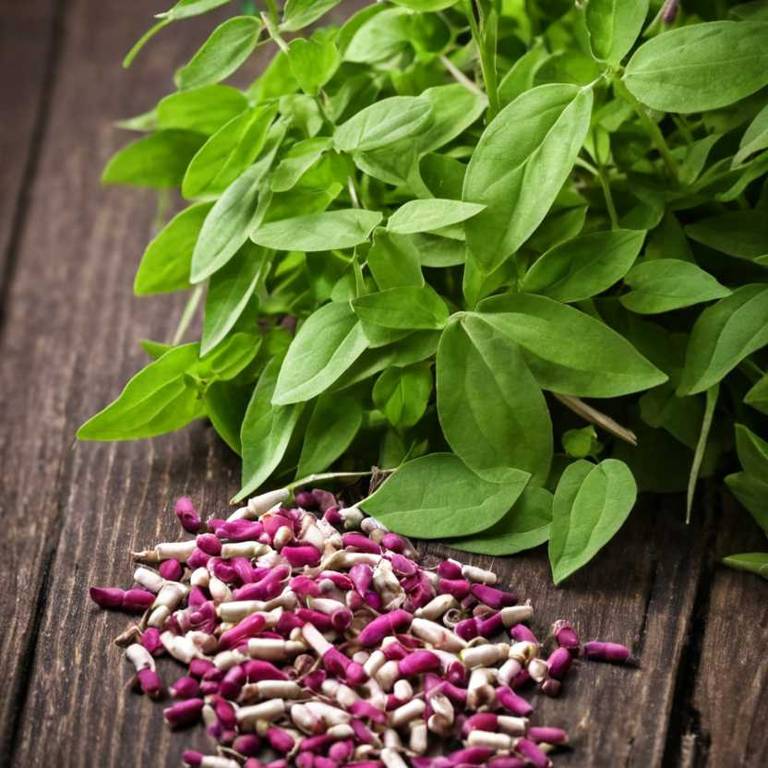Desmodium (Desmodium adscendens)
Desmodium (Desmodium adscendens) is a member of the Fabaceae family, native to Africa, India, and Southeast Asia. Traditionally, its leaves, stems, and roots have been used for decoctions, infusions, and poultices.
This herb is particularly valued for its anti-inflammatory, tonic, and bitter actions, and has a long history of use in african traditional medicine, traditional chinese medicine, and ayurvedic medicine.

Quick Facts / Key Information
| Common Name | Desmodium |
|---|---|
| Scientific Name | Desmodium adscendens |
| Plant Family | Fabaceae |
| Genus | Desmodium |
| Species | adscendens |
| Native Range | Africa, India, Southeast Asia |
| Plant Parts Used | Leaves, Stems, Roots |
| Primary Medicinal Actions | Anti-Inflammatory, Tonic, Bitter |
| Primary Traditional Systems | African Traditional Medicine, Traditional Chinese Medicine, Ayurvedic Medicine |
| Historical Preparation Methods | Decoction, Infusion, Poultice |
Botanical Identity
- Scientific Name
- Desmodium adscendens
- Common Name
- Desmodium
- Synonyms / Alternative Names
- Babylonian Spinach, Climbing Desmodium, Common Desmodium
- Plant Family
- Fabaceae
- Genus
- Desmodium
Botanical Description
- Growth Habit
- Perennial herbaceous plant.
- Height
- It typically grows to a height of 1 to 2 meters.
- Leaves
- Ovate leaves with upper surface glabrous and lower surface pubescent, bearing distinct stomatal bands along the midrib.
- Flowers
- Inflorescences are spike-like clusters with actinomorphic flowers having five white petals and five yellow stamens arranged in a distinct helix around the style.
- Stems
- Stems are erect, herbaceous, with opposite branching, glabrous surface, and nodes bearing stipitate stipules.
Traditional Uses / Historical Use
Traditional Systems
- African Traditional Medicine
Historical Preparation Methods
- Decoction
- Infusion
- Poultice
- Powder
Medicinal Actions
- Anti-inflammatory
- Commonly referenced as a calming anti-inflammatory, in inflammation-focused discussions.
- Tonic
- Traditionally described as a cooling tonic, for long-term use contexts.
- Bitter
- As described in traditional systems, a gentle bitter, for flavor-based applications.
- Diuretic
- Historically regarded as a warming diuretic, for moisture-related balance.
Active Compounds
- Flavonoid
- Plant-based polyphenolic compounds frequently distributed throughout aerial plant parts.
- Tannin
- Plant-derived compounds known for their ability to bind proteins.
- Phenolic Acid
- Simple phenolic molecules widely distributed across plant tissues.
- Coumarin
- A class of aromatic organic compounds found in many plant species.
Modern Research Overview
Modern scientific investigation of this plant has focused on identifying its chemical constituents and examining their properties in controlled research settings. Comprehensive study summaries will be incorporated into this section as additional sources are reviewed.
Safety & Contraindications
- General Precautions
- Caution is advised in certain contexts based on traditional use and available information.
- Contraindications
- Reports outlining specific contraindications for this herb are limited.
- Allergies
- Allergic reactions associated with this herb have not been well documented.
- Drug Interactions
- Available information regarding interactions with pharmaceutical drugs is limited.
- Toxicity
- Reports of toxicity related to this herb are not well documented in available literature.
- Pregnancy & Breastfeeding
- Information addressing pregnancy and breastfeeding-related safety for this herb is limited.
Preparation & Usage Methods
- Infusion
- Plant material is steeped in hot water to extract water-soluble compounds.
- Decoction
- A preparation method involving prolonged boiling of roots, bark, or dense plant material.
- Poultice
- Poultices involve external application of prepared plant matter.
- Powder
- Dried plant material is ground into a fine powder.
- Extract
- Extracts are created by dissolving plant material in a suitable non-alcoholic medium.
Growing, Harvesting & Storage
Growing / Cultivation
- Soil
- Prefers loamy soil with well-drained conditions. Typically grows best in organically rich soils.
- Sunlight
- Thrives in full sun. Tolerates full sun to partial shade.
- Watering
- Prefers well-balanced moisture levels. Tolerates periodic dry conditions.
Medical Disclaimer
The information provided on this page is for educational and informational purposes only. It is not intended to diagnose, treat, cure, or prevent any medical condition. Always consult a qualified healthcare professional before using any herb for medicinal purposes.